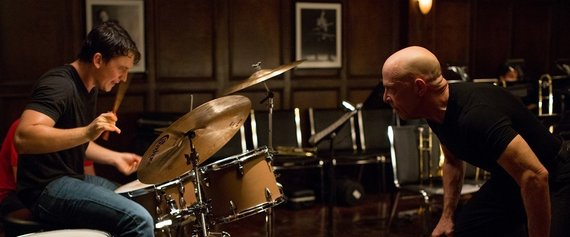
When J.K. Simmons strode to the podium to claim his 2015 Academy Award for Best Performance by an actor in a supporting role for Whiplash, he had completed a clean sweep. He had run the table, receiving top honors in his category from all of the societies and juries that make those determinations in cinema. As an artist, this is a fine comeuppance for Simmons, who has been a steady and eminently watchable character actor for two-plus decades.
I took in Whiplash in an entirely different manner than I usually view a film. I had some advance knowledge of the story, acutely aware of the unanimous critical acclaim that was building for Simmons. I went to theater knowing that I was going to be experiencing something very special. As the final credits rolled, I contemplated my own coaching approach, and to what extent a personality like Simmons's character, Terrence Fletcher, would be taken seriously in business.
The Relationship Between Coaching and Performance
With its scintillating jazz score and intimate look inside jazz ensemble culture, Whiplash is a pleasure to watch. But the film is not about the music. It is about the raw human conflict that emerges between the tyrannical, in-your-face Fletcher and his ambitious, reserved student, Andrew Neiman (played by Miles Teller) in the cultivation of the perfect performance.
Whiplash is unconcerned with what goes on outside the rehearsal room or off of the concert stage. The sidebar romance, awkwardly initiated by Andrew, would ostensibly be a breeding ground for distraction. But for this genius drummer, the dalliance is completely suppressed by his desire to be the best. Andrew is concentrated on improving his skills, which sets the stage for future confrontations.
The story arc is reminiscent of Shine, a film in which a young concert pianist, David Helfgott (magnificently played by the Oscar-winning Geoffrey Rush), is brought to the brink of madness by his dominating father over the mastery of Rachmaninoff's 3rd Concerto. Both students show the mental and physical distress of pushing their limits. Andrew, his palms bloodied from frenetic drumming, made it evident that he was literally as well as figuratively put through a meat grinder.
Simmons's character embodies the dark side of seeking perfection and demonstrates the extremes to which a teacher will go in extracting the best possible output from a student. Andrew counteracts the venomous Fletcher with stoicism, sloughing off the latter's physical and verbal abuse, and raising his level of performance. The dissonance between them can teach us a great deal about what defines a healthy coaching relationship in business:
1). Establishing Trust and Mutual Accountability
Effective coaching is predicated on instilling a winning mindset, prioritizing goals and guiding others to achievement. In order to optimize the outcomes of an engagement, both parties have to commit to the process. Fletcher does not facilitate clarity, show understanding, or frame a purpose for the eager-to-please Andrew. Good coaches set the tone early, keep their clients grounded in the moment, and take responsibility for their actions. They also keep their influence in check. Above all, they create a safe environment where idea exchange and learning can take place.
2). Strengthening Competencies and Reinforcing Positive Behaviors
From their first strained meeting, teacher and student never arrive at equilibrium. Fletcher is on Andrew from the get-go, more interested in calling attention to the young drummer's shortcomings than coaxing the music out of him. Although we see hints of his underlying humanity, Fletcher is brutal, relentlessly sarcastic, and at times inexplicably vicious. There is no confidence building here, no buoying of spirits. Any business coach that would choose to berate, deride, or ridicule a client has no business coaching.
3). Showing a Vested Interest in Personal Welfare
Fletcher's impetuous torrents of "instruction" and lack of rapport do not reflect a concern for the well-being of his student. Theirs is an adversarial relationship, one that becomes increasingly vindictive. Fletcher has no desire to see Andrew succeed. A true teacher holds a student in the highest regard, keeps the conversation positive, and focuses on progress. Serious business coaching requires an investment of emotional capital, collaborative thinking and frequent pauses for reflection. There is no competition or butting of heads. And there is certainly no face slapping or throwing of F-bombs.
4). Promoting Growth Through Correcting Mistakes
Fletcher abhors imperfection and is ultra-critical of Andrew's technique. Without being given any leeway, Andrew cannot learn from his mistakes, and is forced to operate from a position of helplessness. Conscientious business coaches understand that a zero-tolerance policy for error does not guarantee results; rather, one's development comes from experiencing failure (and repeatedly so). They inspire performance by elevating their client's self-belief, providing constructive feedback, and minimizing stress.
Parting Thoughts
♦ It can be argued that Fletcher's methods, although unorthodox and unsavory, were highly effective. Thrown to the wolves by the vengeful instructor, Andrew rose to the occasion, somehow managed to cobble together the beat for a piece he was not prepared to play, manipulated his circumstances, and won out in spite of Fletcher.
♦ Andrew's empowerment at the end of the film begs the question: Did the teacher influence the desired effect, or was the student capable of the performance? Those who are coached well in business feel that their achievements are a byproduct of that coaching and give credit where credit is due.
♦ The film's exhilarating ending is a classic example of the student taking the teacher to school. Is Fletcher's nod of acknowledgment one of approval or concession? Did he suspend his bloated ego long enough to allow his student to at least bask in the glory of his achievement? Call it what you will; that was one cool, jazzy riff.
